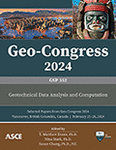Differentiable Programming for Inverse Estimate of Soil Permeability and Design of Duct Banks
Publication: Geo-Congress 2024
ABSTRACT
Underground duct banks carrying power cables dissipate heat to the surrounding soil. The amount of heat dissipated determines the current rating of cables which in turn affects the sizing of the cables. The dissipation of heat through the surrounding soils happens through conduction and convection. The mode of heat transfer depends on the soil’s thermal and hydraulic properties like diffusivity and permeability. The soil surrounding the cables could be designed to have maximum heat dissipation so as to have an improved current rating of cables. Differentiable programming is a novel technique that combines automatic differentiation with gradient-based optimization to minimize a loss function. Hence, differentiable programming can be used to evaluate input parameters based on output results. Given a desired heat distribution in the soil and a temperature source, we use differentiable programming to solve the inverse problem of estimating the soil permeability. In the present study, we employ differentiable programming to optimize the design of buried duck bank and the backfill soil to improve the heat dissipation. The design involves optimizing the permeability and size of the fill material compared to the surrounding natural soil. We develop an inverse finite difference code in the Julia programming language and ForwardDiff package to implement automatic differentiation. We demonstrate the design capabilities of the differentiable programming technique to obtain the optimum permeability of the back fill material from the norm of the temperature distribution in the surrounding soil.
Get full access to this article
View all available purchase options and get full access to this chapter.
REFERENCES
Baydin, A. G., Pearlmutter, B. A., Radul, A. A., and Siskind, J. M. (2018). “Automatic differentiation in machine learning: a survey.” Journal of Marchine Learning Research, 18, 1–43.
Bezanson, J., Edelman, A., Karpinski, S., and Shah, V. B. (2017). “Julia: A fresh approach to numerical computing.” SIAM review, 59(1), 65–98.
Griewank, A. (2003). “A mathematical view of automatic differentiation.” Acta Numerica, 12, 321–398. doi:https://doi.org/10.1017/S0962492902000132.
IEC60287-1. (2006). “Electric cables - calculation of the current rating.”, International Standard.
Kumar, K., El Mohtar, C., and Gilbert, R. (2022). “Conductive and convective heat transfer in inductive heating of subsea buried pipelines.” Journal of Pipeline Systems Engineering and Practice, 13(4), 04022031.
Neher, J., and McGrath, M. (1994). “The calculation or the temperature rise and load capability of cable systems.” RATIO, 50(2), 5.
Revels, J., Lubin, M., and Papamarkou, T. (2016). “Forward-mode automatic differentiation in Julia.”.
Wengert, R. E. (1964). “A simple automatic derivative evaluation program.” Communications of the ACM, 7(8), 463–464.
Information & Authors
Information
Published In
History
Published online: Feb 22, 2024
ASCE Technical Topics:
- Architectural engineering
- Building systems
- Business management
- Cables
- Computer programming
- Computing in civil engineering
- Diffusion
- Diffusion (thermal)
- Duct
- Engineering fundamentals
- Engineering mechanics
- Equipment and machinery
- Geomechanics
- Geotechnical engineering
- HVAC
- Management methods
- Permeability (soil)
- Practice and Profession
- Ratings
- Soil mechanics
- Soil properties
- Temperature (by type)
- Temperature distribution
- Thermal properties
- Thermodynamics
- Transport phenomena
Authors
Metrics & Citations
Metrics
Citations
Download citation
If you have the appropriate software installed, you can download article citation data to the citation manager of your choice. Simply select your manager software from the list below and click Download.
